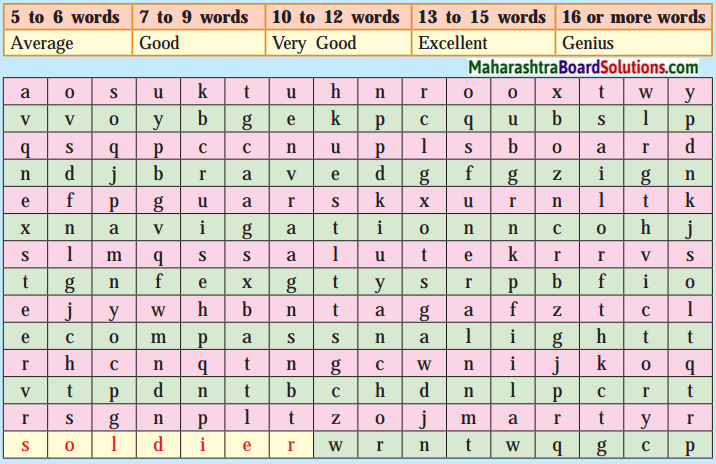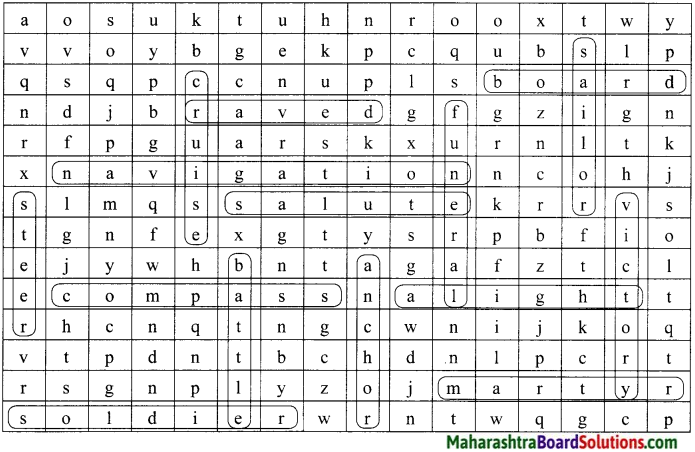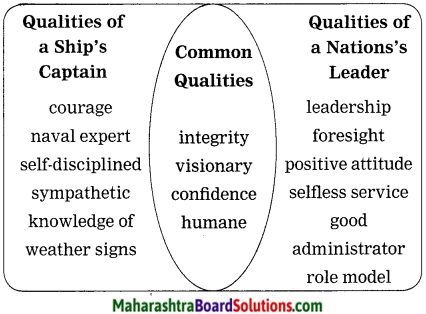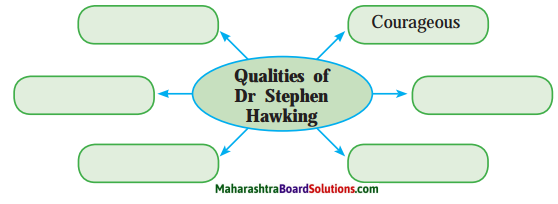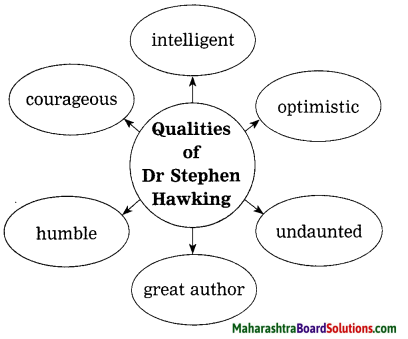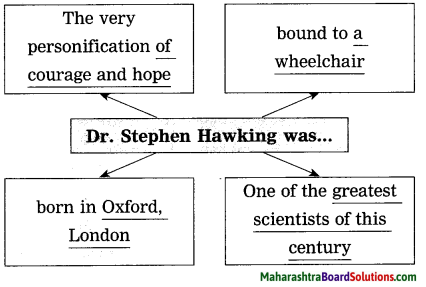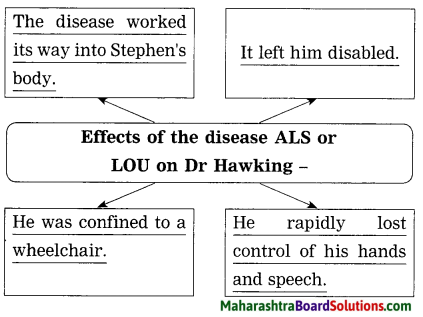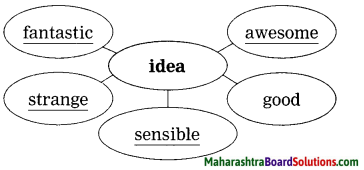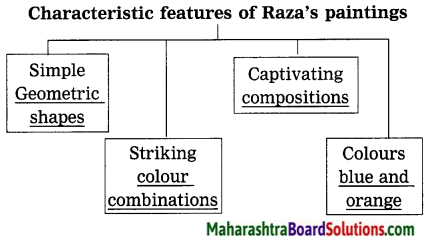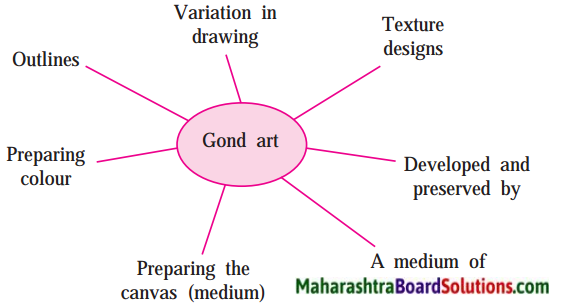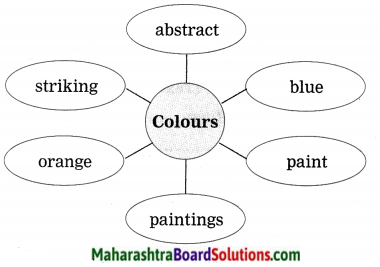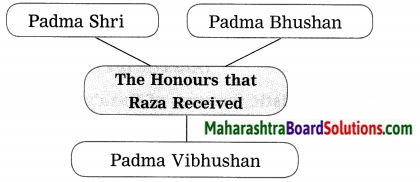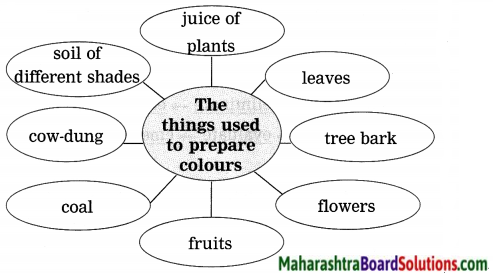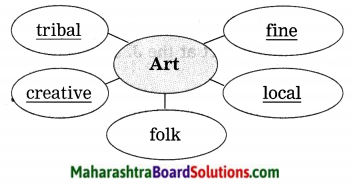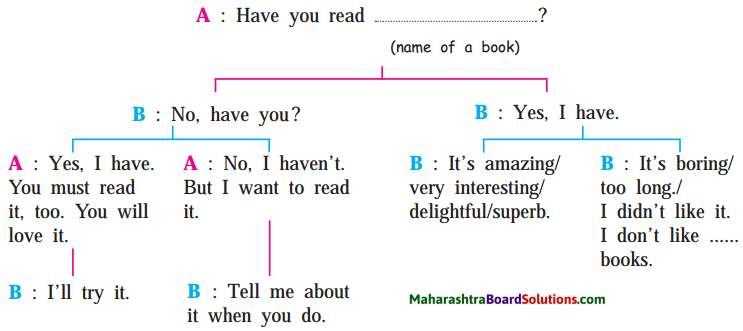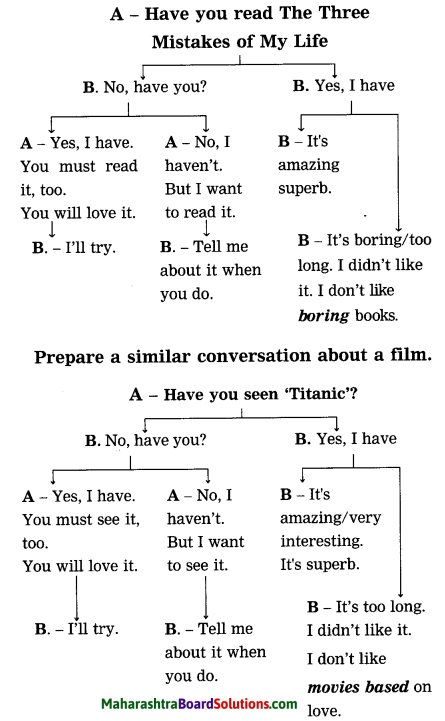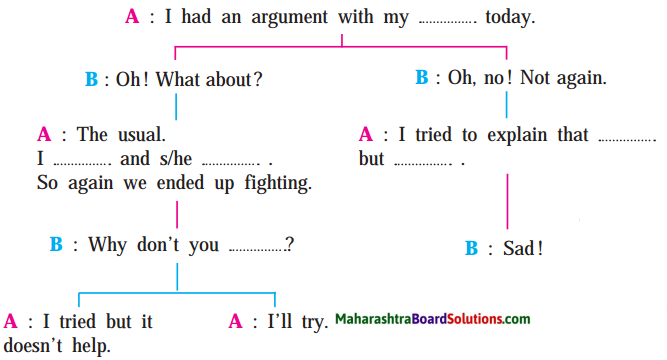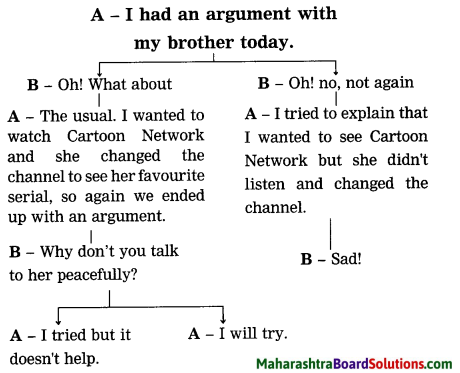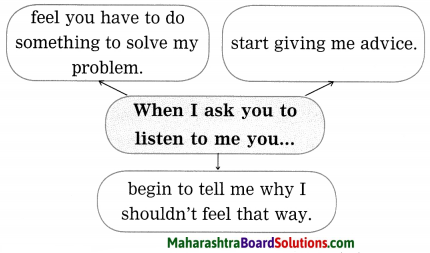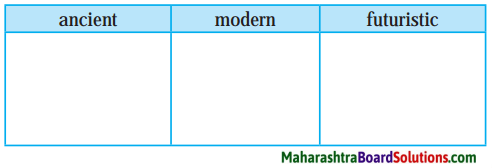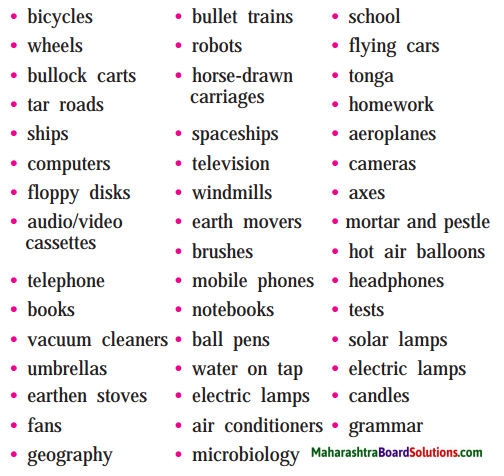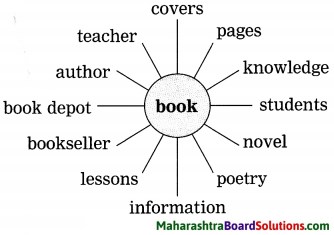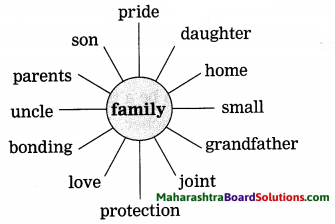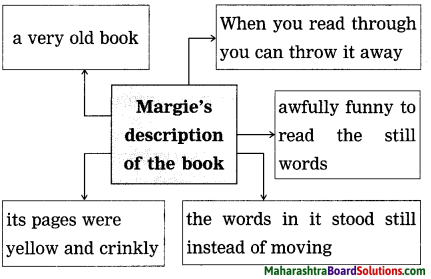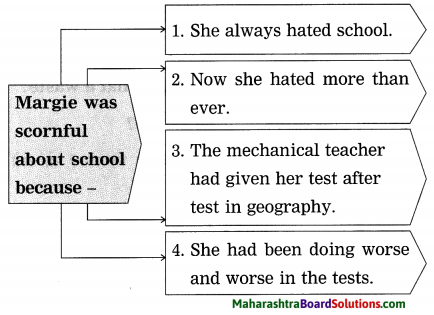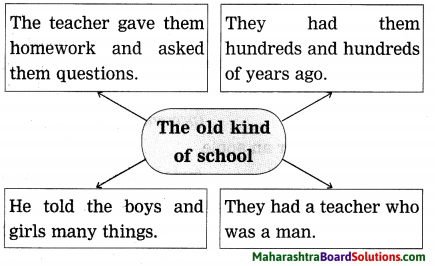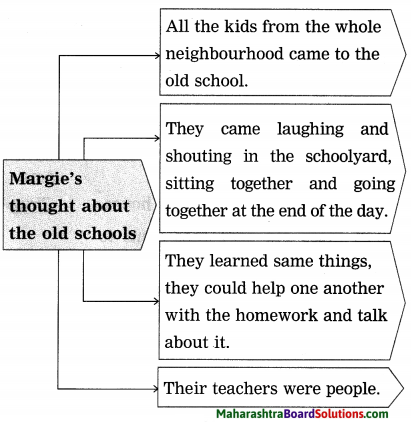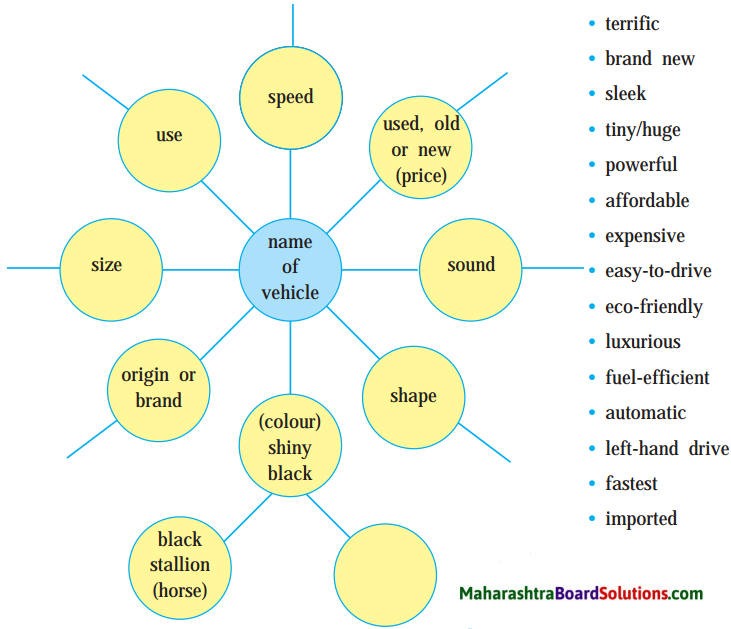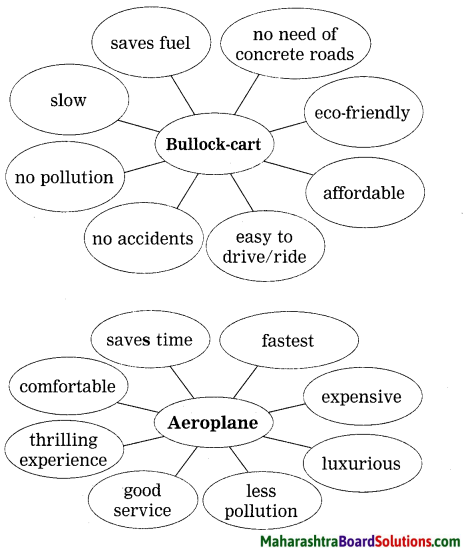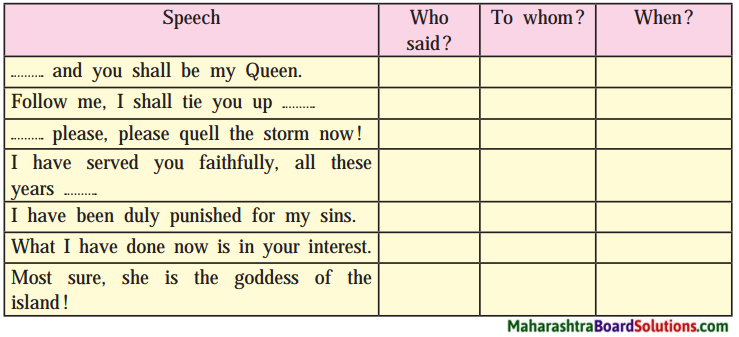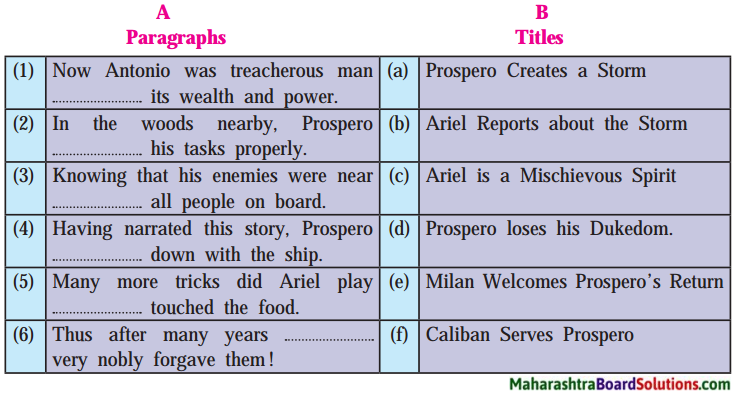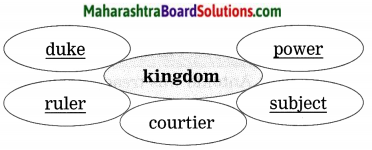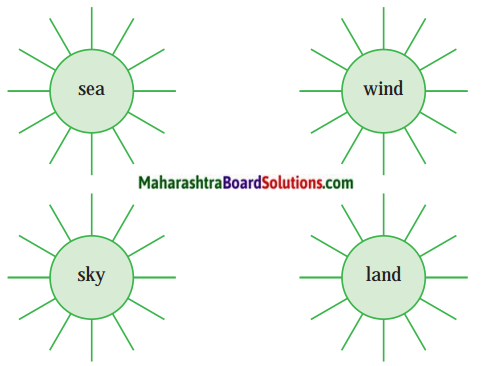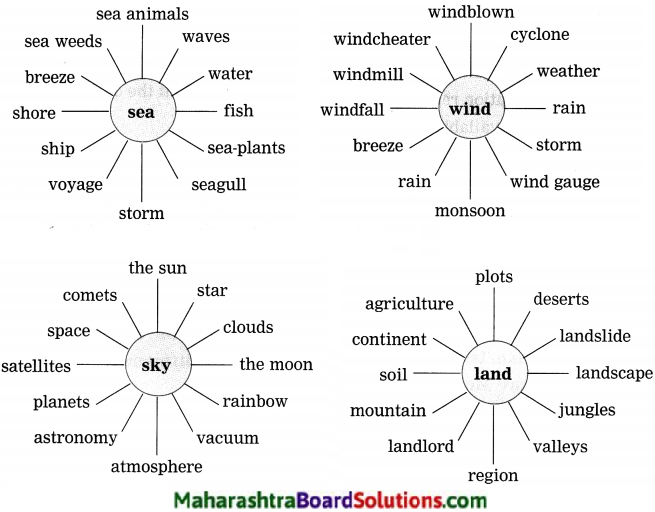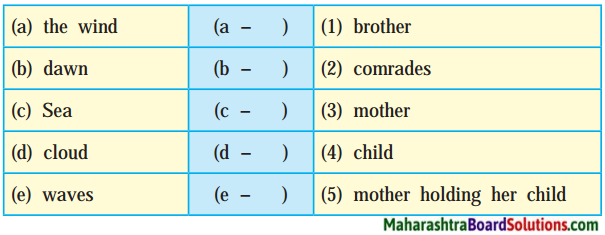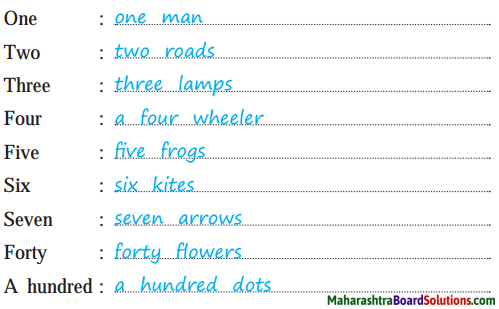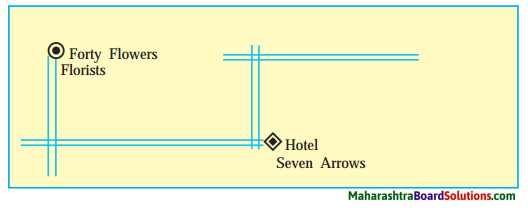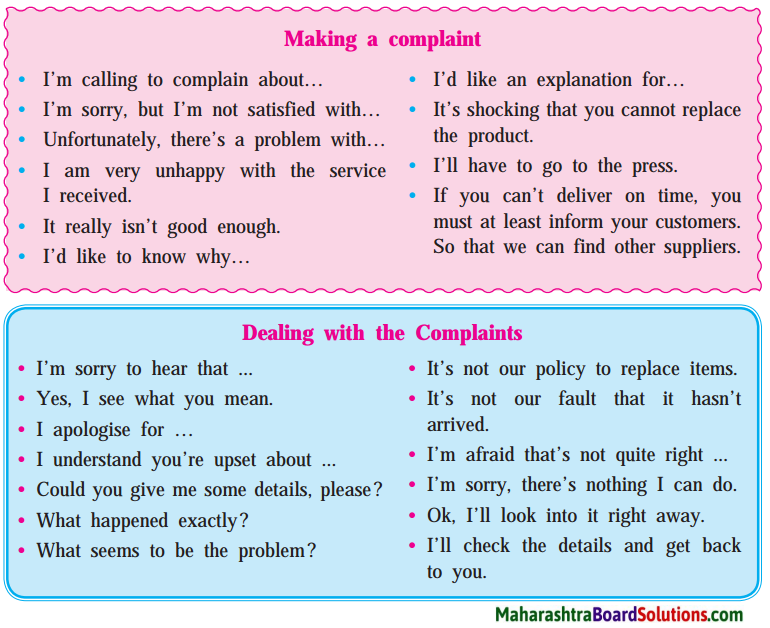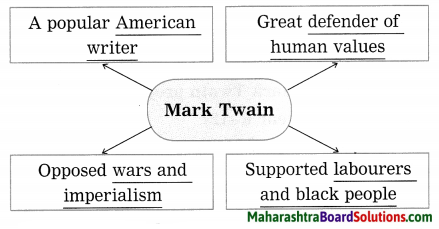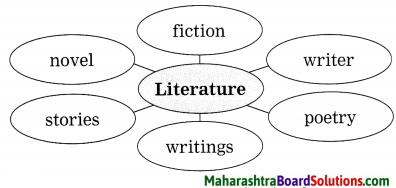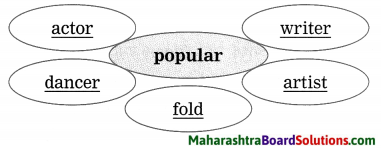Class 10 English Chapter 4.5 Question Answer Maharashtra Board
Balbharti Maharashtra State Board Class 10 English Solutions My English Coursebook Chapter 4.5 Joan of Arc Notes, Textbook Exercise Important Questions and Answers.
Joan of Arc Poem 10th Std Question Answer
My English Coursebook Standard Ten Guide Chapter 4.5 Joan of Arc Textbook Questions and Answers
Warming up:
Chit-chat
1. Discuss in groups whether you would like to join the Armed Forces. Yes/No. Say Why? Why not? Each one should give 2 to 3 reasons for their responses.
Question 1.
Discuss in groups whether you would like to join the Armed Forces. Yes/No. Say Why? Why not? Each one should give 2 to 3 reasons for their responses.
Answer:
(a) Yes, I would like to join the Armed Forces because ……………..
- It is my passion to serve my country by joining Armed forces.
- It gives an opportunity to serve at different places and interact with different people everyday.
- It keeps us physically and mentally fit.
(b) No, I wouldn’t like to join the Armed Forces because …………………..
- I am not physically and mentally prepared for this field.
- I have decided another career option for myself.
- I don’t like to leave my parents and live away from them.
- I am afraid of wars and killing and disaster that comes with them. I hate them all.
![]()
Question 2.
Also discuss what areas of work are open for women in Armed forces in India.
Answer:
All wings of the Indian Armed Forces allow women in combat roles (Junior rank) and combat supervisory roles (Officers).
- They can work in administrative sections in the Armed Forces.
- They can work in the medical field as a doctor, nurse or any other related post.
- They can join the paramilitary forces of India.
1. Discuss in groups/pairs and make lists of the weapons used in the old times and in the present times:
Question 1.
Discuss in groups/pairs and make lists of the weapons used in the old times and in the present times:

Answer:
| Weapons used in the Past | Weapons used nowadays |
| Sword Axe Spear Shield Dagger and knives |
Rifles, Machine guns, Tanks, Grenade Aircraft Submarines Chemical weapons (gas, etc.) Biological weapons (germs, etc.) |
2. Imagine that you are the captain of your school Kabaddi/Football team. Your final match is against a very strong team. Prepare a short pep-talk of about 60 to 80 words that you would give as a Captain, to encourage your team.
Question 1.
Imagine that you are the captain of your school Kabaddi/Football team. Your final match is against a very strong team. Prepare a short pep-talk of about 60 to 80 words that you would give as a Captain, to encourage your team.
Answer:
My dear teammates,
I have heard about a good quotation-winning or losing a game is not important but playing with spirit is important. We get good and useful experiences as participants. Success is not always about winning but being happy with the participation and playing to fullest ability.
We know that strength of our team is each individual member and the strength of each member is the team. The player that fights and works the hardest will always come out on the top. If you find out the strength in you and push forward to work hard for yourself and for the team, I am sure you can do a lot.
Leave your negativity and get in the habit of the doing things the right way in the game. Blaming others for not reaching your goal is pointless. It is your goal and you are the only one who can achieve it. I know champions are those who work to the point of exhaustion when no one else is watching.
Use your calibre and be a champion and success will be yours.
All the best!
![]()
3. When different Prepositions are added to the same action verb, meaning of the phrase thus formed changes.
Question 1.
When different Prepositions are added to the same action verb, meaning of the phrase thus formed changes.
Examples:
- call out – announce
- call at – visit
- call far – summon
- call up – make a telephone call
Try to guess the meanings of the underlined phrases and write them down:
Question (a)
He promised me to look into the matter.
Answer:
to inspect carefully, to investigate.
Question (b)
He wanted to look for his lost book.
Answer:
to search for.
Question (c)
An epidemic of cholera broke-out in the village.
Answer:
widely spread.
Question (d)
The thieves broke into the apartment.
Answer:
entered by force.
Question (e)
She has to carry out her duty regularly.
Answer:
discharge/perform
Question (f)
You must carry on trying for success.
Answer:
continue
English Workshop:
1. Read the extract from G. B. Shaw’s play on Joan of Arc and fill in the Tree diagram:
Question 1.
Read the extract from G. B. Shaw’s play on Joan of Arc and fill in the Tree diagram: (Answer is directly given.)
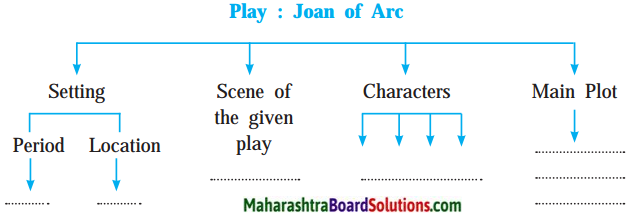
Answer:
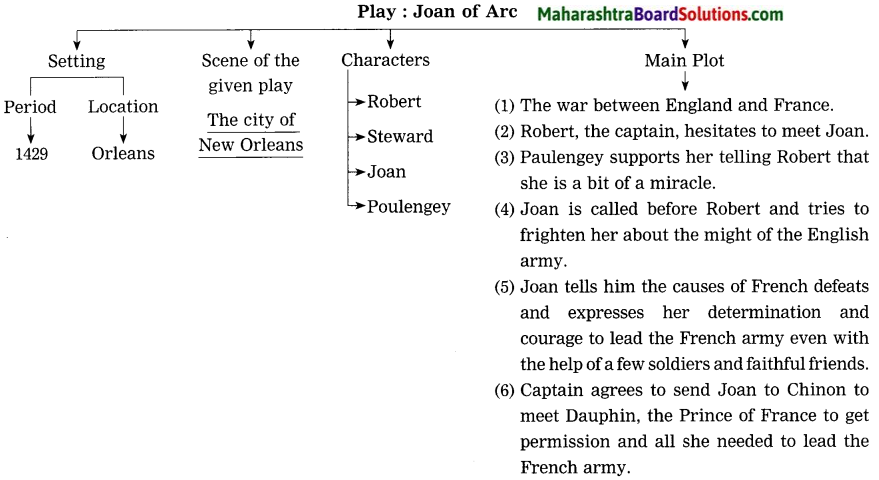
![]()
2. Pick out from the play 2 lines each that prove the following:
Question 1.
Pick out from the play 2 lines each that prove the following:
Joan of Arc
Her confidence
1. …………………..
2. …………………..
Her courage
1. …………………..
2. …………………..
Her determination
1. …………………..
2. …………………..
Answer:
| 1. Her confidence | 1. The Dauphin will give me, all I need, to free Orleans. 2. Three men will be enough for you to send with me. |
| 2. Her courage | 1. You wouldn’t see me. But here I am. 2. I can find a soldier’s armour that will fit me well enough. |
| 3. Her determination | 1. There will be no trouble for you, Squire. 2. I will teach them all to fight for France. |
3. Match the comparisons as given in the extract:
Question 1.
Match the comparisons as given in the extract:
| A | B |
| 1. as easy as | (a) like sheep |
| 2. as mad as | (b) like a rat in the corner |
| 3. drive the soldiers | (c) a bit of a miracle |
| 4. The Dauphin is | (d) as she is |
| 5. Joan of Arc is | (e) the steward |
| (f) chasing a cow |
Answer:
- as easy as – chasing a cow
- drive the soldiers – like sheep
- The Dauphin is – like a rat in a corner
- Joan of Arc – a bit of miracle
- as mad as – she is
4. Say Why?
Question (a)
Joan wanted to meet the Captain Squire? (%MT wq iN^dl ift?)
Answer:
Captain Squire was to give her a horse, armour and some soldiers and send her to the Dauphin. He thought that she wouldn’t dare to meet him. But being courageous she came to meet the Captain and showed her confidence. She wanted the Captain to give her his order to go to Dauphin, the prince of France.
Question (b)
Joan did not ask for many soldiers from the Captain Squire?
Answer:
Joan did not ask for many soldiers from the Captain Squire because she was fully confident about fighting against the English with a few warriors who would join her in the battle. She was also sure that the Dauphin would give her soldiers and all that she needed to free Orleans.
Question (c)
Poulengey, Jack and Dick offered to accompany Joan?
Answer:
Being kind and a gentleman Jack would go willingly with Joan and even she managed Poulengey as he was sure that she was like a miracle. They had promised to go with Joan because they had faith in her valour. Every one was as mad as she was for freedom of their country; so they had offered to accompany Joan.
Question (d)
French soldiers were always beaten?
Answer:
The French soldiers were always beaten because they used to fight only to save their skins. They used to run away from the battlefield to save their lives. They always cared only for their own lives, and not for their nation.
Question (e)
Captain Squire Robert said, “I wash my hands off it.”-Why did he say so?
Answer:
Captain Squire Robert realised that Joan could inspire anybody. But he was not ready to take any responsibility, because he knew that he was taking a big chance and was not sure about the win. He wanted to stay away if anything went wrong by his decision. He would be responsible only for sending Joan to Dauphin and nothing else. So he said, “I wash myhands off it.”
![]()
5. Using a dictionary, find the difference between the following pairs of phrases. Make sentences of your own with each of them:
Question 1.
Using a dictionary, find the difference between the following pairs of phrases. Make sentences of your own with each of them:
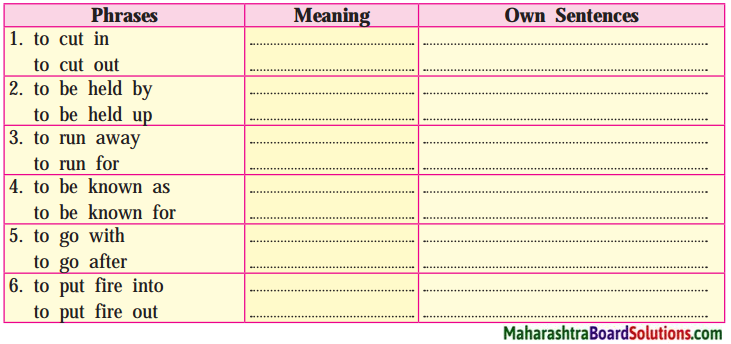
Answer:
| Phrases | Meaning | Own Sentences |
| 1. (a) to cut in (b) to cut out |
(a) interrupt (b) remove/cut |
(a) When I was talking with Arjun, Abid cut in our conversation. (b) The director cut out several scenes when objection was raised by Censor Board. |
| 2. (a) to be held by
(b) to be held up |
(a) kept/maintained/will take place (b) delay/stop/block the movement |
(a) The meeting will be held by next Saturday. (b) The match was held up by heavy rains. |
| 3. (a) to run away (b) to run for |
(a) to leave a place secretely (b) run for something |
(a) He ran away from home when he was only fifteen. (b) The picnickers ran for shelter when the rain started. |
| 4. (a) to be known as (b) to be known for |
(a) to be best known as (b) to be famous or known because of something |
(a) Mohandas Karamchand Gandhi is known as Mahatma Gandhi to all of us. (b) Miller is known for his whimsical paintings and sculpture. |
| 5. (a) to go with (b) to go after |
(a) to choose or accept something (b) to try to catch or stop something |
(a) I think we should go with yellow for the drawing room. (b) You would better go after her and tell her you’re sorry. |
| 6. (a) to put fire into (b) to put fire out |
(a) heat up/put on the fire. (b) to extinguish a fire. |
(a) She spends much of her time in putting fire into others lives. (b) The firemen were able to put out the fire before too much damage. |
6. From an Indian history book or Internet find out information about Indian Women (queens) who led battles.
Question 1.
From an Indian history book or Internet find out information about Indian Women (queens) who led battles. (For example, Rani of Jhansi and Rani Karnawati of Mewad). Write out 3 points of similarity and 3 points of contrast between any one of the above Indian Queens and Joan of Arc. Write in your own words:

Answer:
| Similarities | Contrast |
| (a) young and beautiful | (a) Joan of Arc was unmarried. |
| (b) brave and courageous | (b) She was poor being a peasant girl. |
| (c) fought for their kingdom/nation. | (c) Rani of Jhansi fought for her adopted son and her kingdom. Rani Karnawati of Mewad fought for her kingdom but Joan of Arc fought for her nation and led the French army to several victories during the Hundred Years War. |
![]()
7. Read the script from:
Question 1.
Read the script:
Answer:
Joan: Good morning, … … … … … … … … … promised to come with me. On Coursebook page 157.
Write a summary of that part of the script (in Indirect Speech) in 15 to 20 lines.
Answer:
Wishing Good morning to Captain Squire, Joan said that he was to give her a horse and armour and some soldiers, and send her to the Dauphin. Robert felt that, that girl was indeed mad so he asked Steward why he had not told him about it. Hearing this Steward told him not to anger her and requested him to give her what she wanted.
After hearing his remark Robert got furious and told Joan that he would send her back to her father with orders to put her under lock and key. But Joan was confident and told him that he thought he would. But it wouldn’t happen that way. She further said that he said he would not see her but there she was. Robert asked her if she was assuming that he would give her what she wanted.
Joan confidently said that he would do so and continued that a horse would cost sixteen francs. It was a big amount of money. But she could save it on the armour. She didn’t need beautiful armour made to her measure, she could find a soldier’s armour that would fit her well enough. She wouldn’t want many soldiers and the Dauphin would give her all, she needed, to free Orleans. After hearing her Robert was shocked and asked if she could free Orleans. She continued with confidence and told him that, it was true and only three men would be enough for him to send with her. Polly and Jack had promised to come with her.
Language Study:
Question (A)
Make the following sentences affirmative without change of meaning.
(a) Negative: I am not so sure, now.
Affirmative: …………………………………..
(b) Negative: He will not be able to stop them.
Affirmative: …………………………………..
(c) Negative: I dont’t remember.
Affirmative: ……………………………………
(d) Negative: I can do no more.
Affirmative: ……………………………………
(e) Negative: Sir, do not anger her.
Affirmative: ……………………………………
(f) Negative: I shall not want many soldiers.
Affirmative: ……………………………………
![]()
Question (B)
Fill in the gaps in the table.
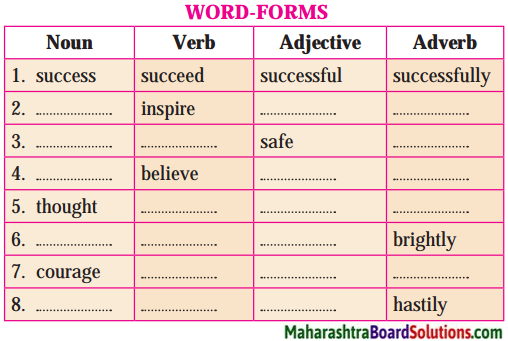
Answer:
| Noun | Verb | Adjective | Adverb |
| 1. success | succeed | successful | successfully |
| 2. inspiration | inspire | inspirational | inspirationally |
| 3. safety | safe | safe | safely |
| 4. belief | believe | believable | believably |
| 5. thought | think | thoughtful | thoughtfully |
| 6. brightness | brighten | bright | brightly |
| 7. courage | encourage | courageous | courageously |
| 8. haste | hasten | hasty | hastily |
My English Coursebook 10th Digest Chapter 4.5 Joan of Arc Additional Important Questions and Answers
Simple Factual Activities:
Question 1.
Name the following:
Answer:
- Military officer – Captain Robert de Baudricourt
- A peasant girl – Joan
- The oldest son of the King France – Dauphin
- The persons who Joan needed to free Orleans – Squire Jack, John Godsave, Dick the Archer, John of
Honecourt and Julian
![]()
Question 2.
State whether the following statements are True or False :
Answer:
- Monsieur de Poulengey and Monsieur de Metz want to go with Joan – True
- Chinon is one of the cities in England. – False
- Poulengey was sure that only miracle can save them. – True
- Joan’s words have put fire into Robert. – False
Question 3.
Complete the following sentences: (Answers are directly given and underlined.)
Answer:
- Soldiers called Joan ‘the Maid’.
- Joan wanted a soldier’s dress.
- The shortest way to save your skin is to run away.
- According to Joan, their soldiers
- Joan is a person of immense faith.
Complex Factual Activities:
Question 1.
Was the Dauphin fit to be a Prince and heir?
Answer:
No, Dauphin was not at all fit to be a Prince and heir.
Question 2.
What was the Squire’s opinion about miracles?
Answer:
According to the Squires miracles don’t happen nowadays.
![]()
Question 3.
What did Robert tell the Steward?
Answer:
Robert told the Steward to go with Joan and keep eyes on her.
Question 4.
What did Robert accuse Poulengey of?
Answer:
Robert accused Poulengey that he was as mad as Joan.
Activity-based on Vocabulary:
Question 1.
Find out two adjectives and two adverbs from the passage :
Answer:
1. Adjectives – wrong, mad
2. Adverbs – seriously, obstinately
Question 2.
What shows Joan was a person of immense faith?
Answer:
Robert thought that his soldiers would not be inspired by anything but Joan was very sure that she along with her soldiers would drive the enemy like sheep and there would not be a single English soldier on the soil of France. It shows that Joan was a person of immense faith.
![]()
Question 3.
What made Robert finally agree to the plan?
Answer:
When Robert realized that if Joan could put fire into Poulengey, she could put it into anybody. She could inspire his soldiers too, so he finally agreed to the plan.
Question 4.
Give one word for the following :
Answer:
- A person of high rank – Squire
- A stupid person – blockhead
- To take for granted – to assume
- Military unit consisting of armoured fighting vehicles – armour
Question 5.
Find out synonyms:
Answer:
- looting – plundering
- seriously- gravely
- following- chasing
- hayfield – meadow.
Activities based on Contextual Grammar:
Question 1.
He is a very kind gentleman.
(Make it exclamatory.)
Answer:
What a kind gentleman he is!
![]()
Question 2.
She is a well-built strong country girl.
(Make it exclamatory.)
Answer:
What a well-built, strong country girl she is!
Make the following sentences affirmative without change of meaning:
Question 1.
Sir, do not anger her.
Answer:
Sir, be calm with her.
Question 2.
I shall not want many soldiers.
Answer:
I shall want few soldiers.
Make it affirmative:
Question 1.
I am not sure, now.
Answer:
I am unsure (doubtful) now.
![]()
Question 2.
He will not be able to stop them.
Answer:
He will be unable to stop them.
Choose the correct question tag:
Question 1.
Choose the correct question tag:
(haven they?, doesn’t he?, aren’t you?, am I?)
- The Steward retreats hastily.
- You are as mad as she is,
- I am not so sure now,
- Jack and Dick have offered to go with her,
Answer:
doesn’t he? aren’t you? am I? haven’t they?
Rewrite as affirmative sentences:
Question 1.
I don’t remember.
Answer:
I forget.
Question 2.
You do not understand Squire.
Answer:
You fail to understand Squire.
![]()
Question 3.
I can do no more.
Answer:
I am unable to do anything more.
Personal Response:
Question 1.
Describe any brave lady as Joan of Arc, from India who fought for her nation.
Answer:
Lakshmibai, the Rani of Jhansi, was the queen of the Princely state of Jhansi in North India. She was one of the leading figures of the first Indian War of Independence of 1857 and became the symbol of resistance to the British Raj by Indian nationalists.
After the death of her husband, the then Head of the British Government of India, Lord Dalhousie, refused to allow her adopted son to become Raja of Jhansi. British then forcibly took possession of Jhansi. Rani Lakshmibai with Tatya Tope and others fought against the British rule. She sacrificed her life to regain her kingdom.
Question 2.
What is your opinion about Joan?
Answer:
I think Joan was really a courageous and brave lady. She dared to fight against the enemy for her country without caring for her own life and family life. It shows that she was really a patriotic person who was proud of her country and loved her country from the bottom of her heart.
Question 3.
Do you love your country? Why?
Answer:
I love my country from the bottom of my heart. It is the place where I was born, brought up and saw this beautiful world. I owe everything to this country. I always think about the betterment of
my country because I really love my country as it is my birthplace, my motherland.
![]()
Do as directed:
Question 1.
Complete the words by using correct letters:
- h o _ s e
- t h i _ k
- m o _ e y
- c r a _ y
Answer:
- horse
- t h i n k
- m o n e y
- c r a z y
Question 2.
Put the words in alphabetical order:
1. order, trouble, captain, promise.
2. assume, armour, afraid, always.
Answer:
1. captain, order, promise, trouble.
2. afraid, always, armour, assume.
Question 3.
Punctuate the following sentences:
1. joan said i dont think it can be very difficult if god is on your side
2. joan said and the dress i may have a soldiers dress squire
Answer:
1. Joan said, “I don’t think it can be very difficult if God is on your side.”
2. Joan said, “And the dress? I may have a soldier’s dress, Squire?”
Question 4.
Make four words (minimum 3 letters each) using the letters in the word : ‘plundering’
Answer:
plunder, ring, under, pun.
![]()
Question 5.
Write related words as shown in the example: (Answers are directly given and underlined.)
Answer:
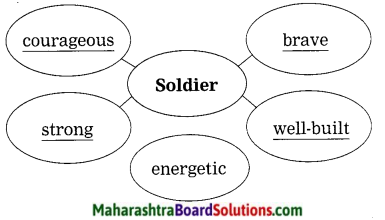
Question 6.
Complete the word-chain of nouns. Add four words, each beginning with the last letter of previous word:
officer, → r…………., …………., …………., ………….
Answer:
officer, → ration , nation , novel, logo.
1. Attempt any one:
Question (a)
Make a meaningful sentence by using the phrase :’ to be afraid of’
Answer:
Most of the people are afraid of ghosts and darkness.
OR
Question (b)
Add a clause to expand the sentence:
This is the young boy
Answer:
This is the young boy who bagged the National Championship in boxing.
2. Attempt any one:
Question (a)
Add prefix or suffix to make new words.
1. talk
2. except
Answer:
1. talkative
2. exceptional
OR
![]()
Question (b)
Make a meaningful sentence using any one of the following words:
1. talk
2. except
Answer:
1. We talked on the phone about our problem.
2. Except Mother, everyone went out for dinner.
My English Coursebook 10th Class Solutions Pdf Unit 4
- The World is Mine Class 10 English Solutions
- Bholi Class 10 English Solutions
- O Captain! My Captain! Class 10 English Solutions
- Unbeatable Super Mom – Mary Kom Class 10 English Solutions
- Joan of Arc Class 10 English Solutions
- A Brave Heart Dedicated to Science and Humanity Class 10 English Solutions
